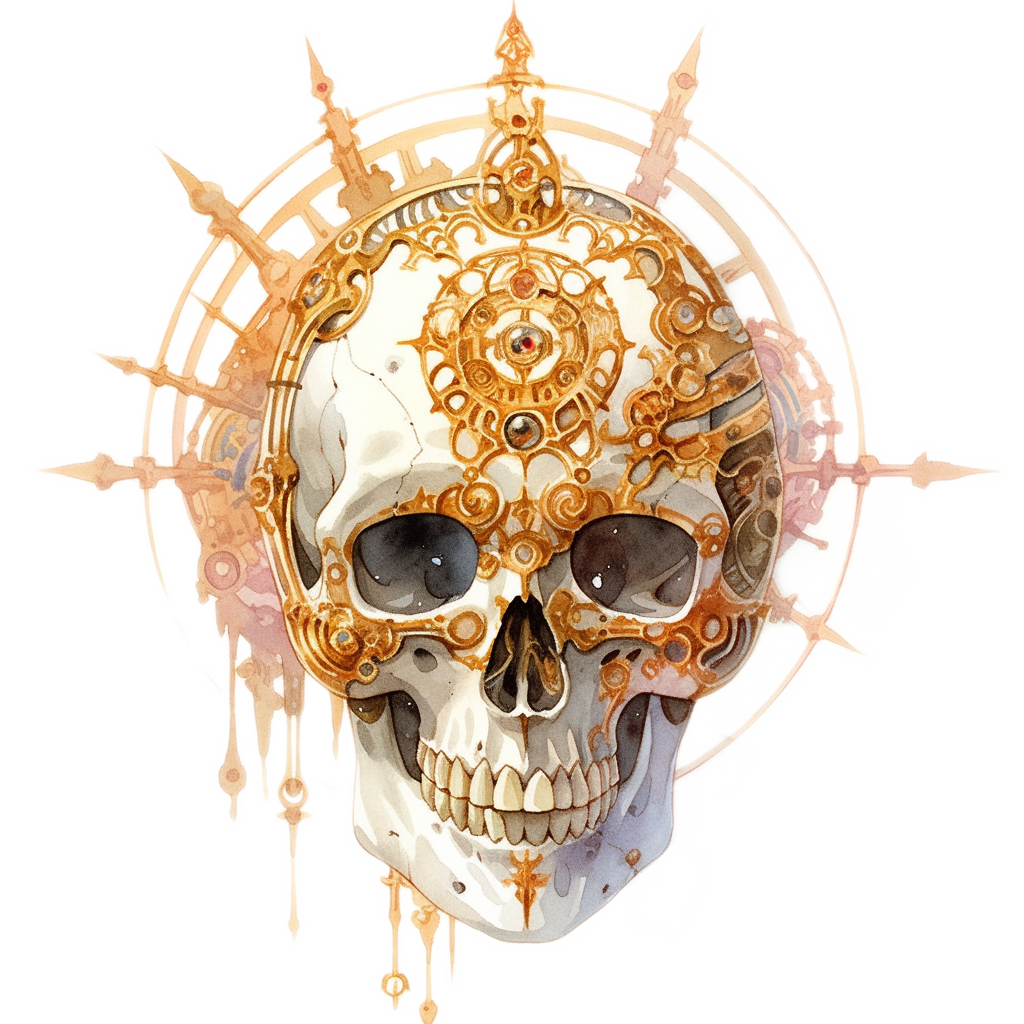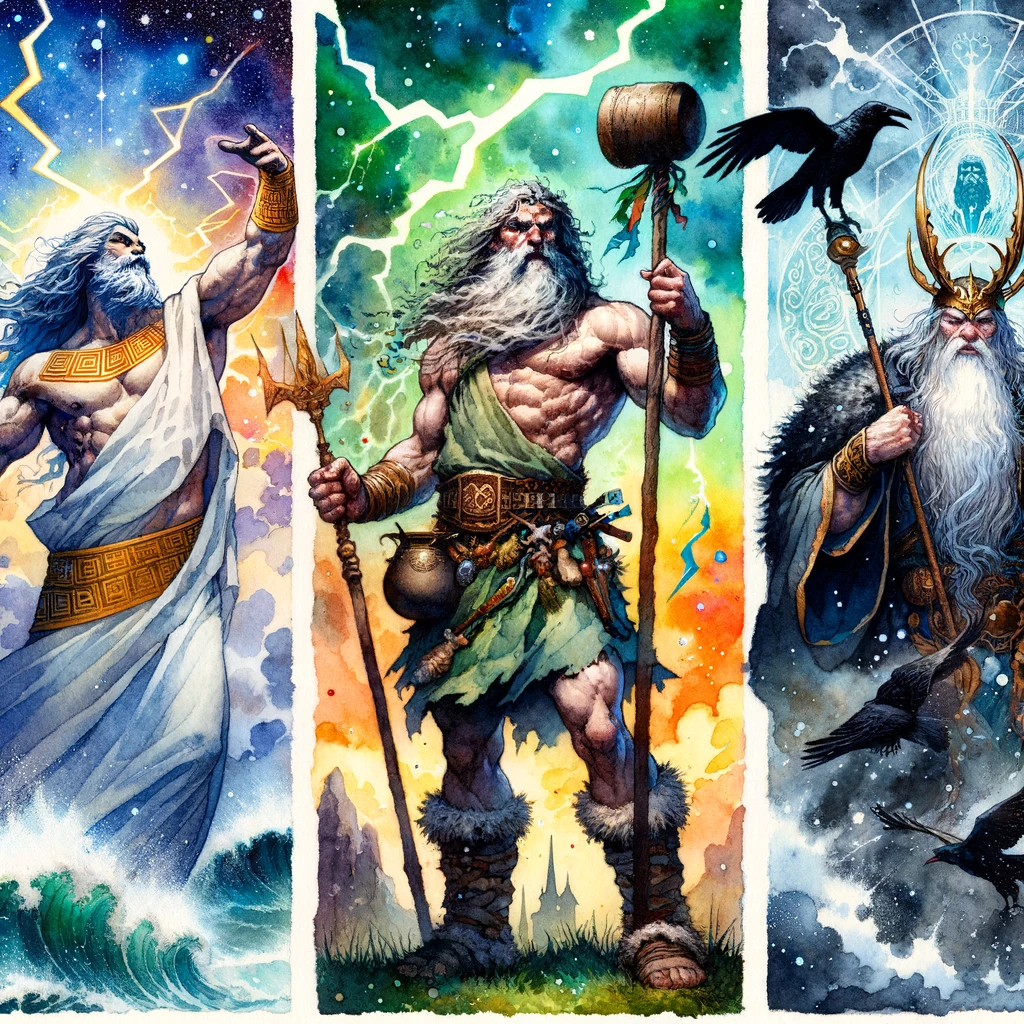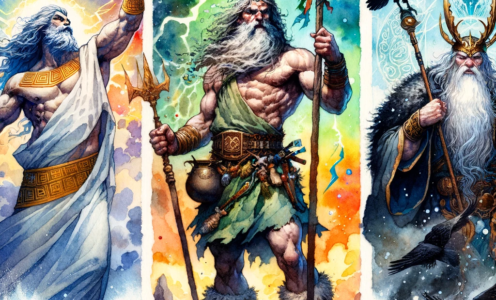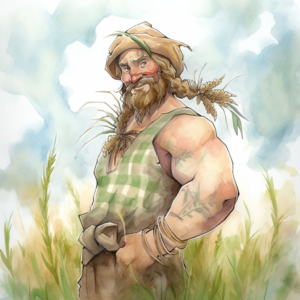The Athar Guide to Father Powers
by Burbank and Corsica Ralopolis
The father gods; the patriarchs of their pantheons. These are the mighty fecund figures who sired dozens of gods and goddesses, their lineage spreading like the roots of Yggdrasil through the myths and legends of countless cultures.
Take Zeus, the self-appointed king of the Greek gods. This cutter’s not just known for his lightning bolt trigger finger; he’s a father many, many times over. His offspring include powers, demipowers, and heroes, from the wise Athena, who sprang fully-formed from his head, to the mighty Hercules, born of a mortal woman. Some of the mothers pursue Zeus, but many more are tricked by him, or worse, are forced into bearing his children. Zeus’ wife Hera inevitably finds out about his dirty business, but unfortunately she takes her vengeance out on Zeus’ victims rather than her husband. The offspring of Zeus are as varied as his moods, but all of them have played pivotal roles in Olympian myths.
Then there’s Odin, the All-Father of the Norse pantheon. A wanderer and a relatively wise ruler, Odin’s known progeny include the likes of Thor, the god of thunder, Baldr, the beloved god of light, Víðarr the power of vengeance and Váli, who was apparently only sire by Odin to avenge the death of Baldr. While he’s kept it quieter than Zeus managed, the chant goes that Odin is also the father of many more of the Norse powers, by various mothers. Odin’s children are as strong and varied as the branches of the World Tree, all making their marks on the Norse sagas.
In the Vedic pantheon, we have Shiva, the destroyer and creator. His children, including Ganesha and Kartikeya, are revered as powerful deities in their own right. Shiva’s offspring embody various aspects of the divine, from wisdom to warfare, reflecting the multifaceted nature of their father. There’s also Anu from the Mesopotamian pantheon. As the sky god, he’s often considered the father of gods, demons, and spirits. His lineage includes powerful deities like Enlil and Ishtar.
Father powers are complex characters, wielding immense might and bearing heavy responsibilities. They’re creators and destroyers, lovers and warriors, wise rulers and fearsome enemies, and unfortunately this power often goes to their heads—or their loins—and they often become sexual predators. Their children carry forth their legacy, for better or worse, shaping the pantheons and instilling drama from their inception.
Betrayal and Patricide
It seems you can’t have a Father Power without a spot of patricide, The tales of betrayal between divine parents and their offspring are as old as the gods themselves, echoing through the ages with themes of power, jealousy, and the inevitable struggle between the old and the new. And we see these sudden and inevitable betrays cropping up time and time again in the myths of the pantheons. It’s almost as if powers are irresponsible barely-concealed psychopaths rather than divine beings worthy of worship. But don’t take my Athar screed at face value, let’s look at the evidence.
Now as usual, the Olympians have the most dramatic history. First, the Titan Cronus overthrew his father Uranus in a most unpleasant betrayal, egged on by his mother Gaia. Don’t get me wrong, Uranus was a nasty piece of work himself, but as they say, the apple of temptation doesn’t fall far from Yggdrasil. Sorry, I may be mixing my pantheons there? Cronus, fearing a prophecy that he too would be overthrown by his own child, swallowed his offspring as his sister-wife Rhea gave birth to them. However, his final son Zeus escaped this fate due to cunning sleight of hand on Rhea’s part, later freeing his siblings and leading a rebellion against Cronus, resulting in the ascendancy of the Olympian powers. Zeus himself then worried about betrayal from his own offspring, although that didn’t stop him fathering dozens of children with no fewer than seven wives, and many more nymphs and mortals. Chant goes he never learned the lessons of Cronus either, as he swallowed his first wife Metis whole after she became pregnant. This barmy cycle of betrayal highlights the relentless nature of power struggles within the divine realm. And underscores why the Athar have a valid aversion to the antics of the so-called gods.
In Norse mythology, Odin, the All-Father, was not without his share of familial strife. His brother, Loki, a power of trickery and mischief, is usually at odds with his fellow Aesir. There’s a prophecy of a cataclysm the Norse call Ragnarok, where the Norse pantheon will be largely destroyed. Loki’s prophesied betrayal is complex, as it intertwines with his nature as a trickster and his alienation from the Aesir. Yet for some reason the Norse powers still associate with Loki—whether this is because his betrayal is inevitable or because they still hope to sway him, who knows. Changing a predicted future is tricky business it seems, even for the so-called powers.
In Vedic mythology, the mighty warrior mother goddess Kali, is sometimes often in conflict with her offspring. Her fierce, uncontrollable nature often puts her at odds with other powers anyway, which I suppose comes with the territory for powers on the chaotic side of the Great Ring.
The story of the Egyptian powers Osiris, Isis, and their son Horus involves betrayal and revenge. Osiris was betrayed and killed by his brother Set, before being sort-of resurrected by Isis. Horus, the son of Osiris and Isis, later avenged his father’s ‘death’ by battling Set, continuing the family drama into the next generation.
These stories of betrayal among the powers, where children turn on parents, or remorseful parents gobble up children, is standard fare when it comes to the realms of the so-called divine. Graybeards claim that these stories reflect the human experience of generational conflict, power struggles, and the cyclical nature of life and rulership. For us Athar though, they are tales that resonate with the very essence of what it means to be divine—these beings are power-hungry and care nothing about consequences.
See Also: The Athar Guide to the Powers



